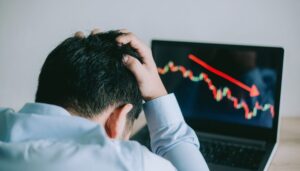Mistakes Every Novice Trader Makes
Trading is a complex endeavor, made all the more challenging by the fact that anyone can do it. Unlike other professions, which require years of schooling and apprenticeships, all you need to start trading is an internet connection and a willingness to lose money.
Of course, this doesn't mean everyone who starts trading will succeed. In fact, most new traders make the same mistakes repeatedly. This blog post will explore some of the most common mistakes novice traders make and how to avoid them.
No Preparation
Novice traders often make the mistake of thinking that they don't need to prepare. They believe all they need to do is jump in and start trading. However, this couldn't be further from the truth.
If you want to be successful at trading, you need to take the time. This means researching, learning about different strategies, and practicing with a demo account before you risk any real money.
Trading without a Plan
One of the biggest mistakes you can make is trading without a plan. Without a plan, it's easy to get caught up in the excitement of the market and make impulsive decisions that can lead to significant losses.

The Common Trading Mistakes and How to Avoid Them
A trading plan should outline your goals, risk tolerance, and strategies for both buying and selling. It's essential to stick to your plan even when things are going well, as it can help you avoid making rushed decisions that could bite you later on.
Miscalculating The Ratio of Risk/Reward
Another big thing that can go wrong is miscalculating the ratio of risk to reward. This is often done by taking too much risk in an attempt to make a quick profit without considering the potential downside.
While it is possible to make a quick profit by taking on more risk, you will also likely lose money if things don't go as planned. Therefore, it is crucial to calculate the potential risk and reward before making any trades.
One way to do this is to use a Risk/Reward Ratio calculator. This will help you determine how much profit you could potentially make compared to how much risk you are taking.
Another way to calculate the risk/reward ratio is to use the following formula:
Probability of Profit x Average Return – Probability of Loss x Average Loss
Avoiding Risk Management
There are a few key things to keep in mind regarding risk management. Firstly, it is important to always have a plan before entering any trade. This plan should include an exit strategy in case the trade does not go as expected.
Secondly, only risk what you can afford to lose. It is also important to diversify your portfolio so that you are not putting all of your eggs in one basket.
Disregarding Market Events
When you're first starting out in the world of trading, it's easy to get caught up in the excitement of it all and start making trades without really considering the market conditions. This is a huge mistake that can often lead to big losses.

Before you make any trade, you need to take a step back and assess the current market conditions. What's happening with the overall market? Is there a particular sector that's hot right now? What are the political and economic conditions like? All these factors can significantly impact your trade, and you need to be aware of them before moving.
Ignoring Trends
When everyone else is buying into a hot new trend, it's easy to think you're missing out on something big if you don't jump on board. But the truth is, most trends don't last, and even if they do, they can be very volatile and difficult to trade.
So instead of chasing trends, focus on finding good quality setups that fit your trading strategy. If a trend does develop that looks like it has some staying power, then you can always enter at a later stage. But don't risk your hard-earned money chasing after every new market fad.
Lack of a Trading Journal
A trading journal is essential for any trader, as it allows you to track your progress and record your trades. Without a trading journal, it is all too easy to forget your successes and failures, which can lead to making the same mistakes over again.
If you are serious about trading, keeping a detailed journal is essential. A trading journal also allows you to reflect on your trades and see what you could have done differently. This can be an invaluable learning experience, as it can help you to avoid making the same mistakes in the future.
Wrong Timing
You can always make the mistake of entering trades at the wrong time. This can be costly, leading to missed opportunities or losses.
Paying attention to market conditions and timing when placing trades is important. Entering trades too early or too late can often lead to disappointing results.
Emotional Trading
When it comes to trading, your emotions can be your worst enemy. It's important to remember that trading is a business and should be treated as such. You need to control your emotions to make sound, logical decisions. When you let your emotions take over, you're more likely to make impulsive decisions that you may later regret.
Trading for Fun
This is by far the most common mistake. New traders enter the market without understanding how it works, and as a result, they often lose money quickly. Many people focus too much on making quick profits instead of taking a longer-term view of their trades. This can lead to bad decision-making and missing out on good opportunities.
Trading is not fun; it's a business. If you're not ready to be dedicated, it's better to stay away.
How to Avoid Trading Mistakes
Even though you can make too many mistakes as a trading newbie, there are also ways to avoid them. Careful planning, following trends, and acknowledging your errors can save you great losses in the future. Finally, taking trading as a serious business can improve your performance.
Here's what you can do to avoid trading mistakes.
Plan Your Trade
When it comes to trading, there is no one-size-fits-all approach. What works for one person may not work for another. The key is to find what works for you and stick to it.
One of the biggest mistakes is not having a plan. A good plan should include your entry and exit points and how much you are willing to risk on each trade. It should also outline your goals and what you hope to achieve from trading. Without a plan, it is very easy to get emotionally attached to a trade and hold on to it even when losing money.
Follow Trends
Novice traders often think they need to follow every trend in the market. This is not only unrealistic, but it can also be costly. Instead of trying to keep up with every trend, focus on a few key areas that are most important to your trading strategy.
Pay attention to news and events that could impact the markets you're watching. This will help you make better-informed trading decisions. Don't get caught up in the hype around new trends. Do your research, and don't make decisions based on emotion.
Record your Mistakes
Recording your mistakes is one of the most important things. It allows you to track your progress, see where you need to improve and avoid repeating the same mistakes.
There are a few different ways to record your mistakes. You can keep a trading journal, a written record of your trades and how they turned out. Another way to track your errors is by using a software program like TradeStation or MetaTrader. These programs allow you to save your trade history and analyze it later. This can be useful for spotting errors in your trading strategy.
Consider Trading To Be a Business
One of the most important things to realize when you start trading is that you are starting a business. This business requires capital just like any other business, and it also requires time and effort to be successful.
Many novice traders think they can just start trading with a few hundred dollars and turn it into thousands overnight. This is simply not the case. Trading is risky, and you need to be prepared for the possibility of losing money. You should only trade with money that you can afford to lose.
Final Words
Novice traders often make mistakes. Some of these are due to inexperience, while others stem from bad habits or incorrect assumptions. However, there are things and tools to help you spot your mistakes and prevent them from happening in the future.
While some errors are entirely up to you, some losses can occur when trading with a bogus brokers. Scammers have their ways of convincing you to deposit the money, promising to help you as an inexperienced investor. What happens, in the end, is that they vanish with your hard-earned money.
Therefore, choosing the right broker is a must, and combined with the strategies mentioned above, you're about to become a pro!
The 2022 World Cup in all its glory
Vous avez aimé cet article ? Partagez et commentez !

















